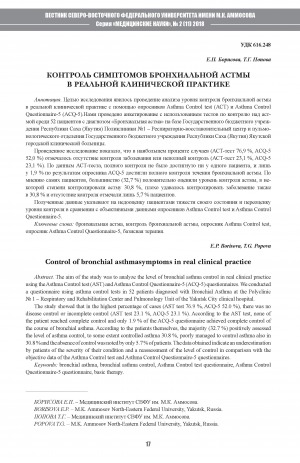Попова Татьяна Гаврильевна Документы 1 - 1 из 1
Количество страниц: 10 с.
Подборки
- Прикладные науки. Медицина. Ветеринария. Техника. Сельское хозяйство > Медицина > Патология. Клиническая медицина > Терапия,
- Прикладные науки. Медицина. Ветеринария. Техника. Сельское хозяйство > Медицина > Патология. Клиническая медицина > Фтизиатрия,
- НАУКА ЯКУТИИ > ПРИКЛАДНЫЕ НАУКИ. МЕДИЦИНА. ТЕХНИКА. СЕЛЬСКОЕ ХОЗЯЙСТВО > Медицина > Патология. Клиническая медицина > Фтизиатрия,
- НАУКА ЯКУТИИ > ПРИКЛАДНЫЕ НАУКИ. МЕДИЦИНА. ТЕХНИКА. СЕЛЬСКОЕ ХОЗЯЙСТВО > Медицина > Патология. Клиническая медицина > Терапия.
Целью исследования явилось проведение анализа уровня контроля бронхиальной астмы в реальной клинической практике с помощью опросников Asthma Control test (АСТ) и Asthma Control Questionnaire-5 (ACQ-5).Нами проведено анкетирование с использованием тестов по контролю над астмой среди 52 пациентов с диагнозом ҺБронхиальная астмаһ на базе Государственного бюджетного учреждения Республики Саха (Якутия) Поликлиники N1 - Респираторно-восстановительный центр и пульмонологического отделения Государственного бюджетного учреждения Республики Саха (Якутия) Якутской городской клинической больницы. Проведенное исследование показало, что в наибольшем проценте случаев (АСТ-тест 76,9 %, ACQ-5 52,0 %) отмечалось отсутствие контроля заболевания или неполный контроль (АСТ-тест 23,1 %, ACQ-5 23,1 %). По данным АСТ-теста, полного контроля не было достигнуто ни у одного пациента, и лишь у 1,9 % по результатам опросника ACQ-5 достигли полного контроля течения бронхиальной астмы. По мнению самих пациентов, большинство (32,7 %) положительно оценили уровень контроля астмы, в некоторой степени контролировали астму 30,8 %, плохо удавалось контролировать заболевание также в 30,8 % и отсутствие контроля отмечали лишь 5,7 % пациентов. Полученные данные указывают на недооценку пациентами тяжести своего состояния и переоценку уровня контроля в сравнении с объективными данными опросников Asthma Control test и Asthma Control Questionnaire-5
The aim of the study was to analyze the level of bronchial asthma control in real clinical practice using the Asthma Control test (AST) and Asthma Control Questionnaire-5 (ACQ-5) questionnaires. We conducted a questionnaire using asthma control tests in 52 patients diagnosed with Bronchial Asthma at the Polyclinic ө 1 - Respiratory and Rehabilitation Center and Pulmonology Unit of the Yakutsk City clinical hospital. The study showed that in the highest percentage of cases (AST test 76.9 %, ACQ-5 52.0 %), there was no disease control or incomplete control (AST test 23.1 %, ACQ-5 23.1 %). According to the AST test, none of the patient reached complete control and only 1.9 % of the ACQ-5 questionnaire achieved complete control of the course of bronchial asthma. According to the patients themselves, the majority (32.7 %) positively assessed the level of asthma control, to some extent controlled asthma 30.8 %, poorly managed to control asthma also in 30.8 % and the absence of control was noted by only 5.7 % of patients. The data obtained indicate an underestimation by patients of the severity of their condition and a reassessment of the level of control in comparison with the objective data of the Asthma Control test and Asthma Control Questionnaire-5 questionnaires
The aim of the study was to analyze the level of bronchial asthma control in real clinical practice using the Asthma Control test (AST) and Asthma Control Questionnaire-5 (ACQ-5) questionnaires. We conducted a questionnaire using asthma control tests in 52 patients diagnosed with Bronchial Asthma at the Polyclinic ө 1 - Respiratory and Rehabilitation Center and Pulmonology Unit of the Yakutsk City clinical hospital. The study showed that in the highest percentage of cases (AST test 76.9 %, ACQ-5 52.0 %), there was no disease control or incomplete control (AST test 23.1 %, ACQ-5 23.1 %). According to the AST test, none of the patient reached complete control and only 1.9 % of the ACQ-5 questionnaire achieved complete control of the course of bronchial asthma. According to the patients themselves, the majority (32.7 %) positively assessed the level of asthma control, to some extent controlled asthma 30.8 %, poorly managed to control asthma also in 30.8 % and the absence of control was noted by only 5.7 % of patients. The data obtained indicate an underestimation by patients of the severity of their condition and a reassessment of the level of control in comparison with the objective data of the Asthma Control test and Asthma Control Questionnaire-5 questionnaires
Борисова, Е. П. Контроль симптомов бронхиальной астмы в реальной клинической практике / Е. П. Борисова, Т. Г. Попова // Вестник Северо-Восточного федерального университета им. М. К. Аммосова. Серия: Медицинские науки.— 2018. — N 2 (11). — С. 17-25.
